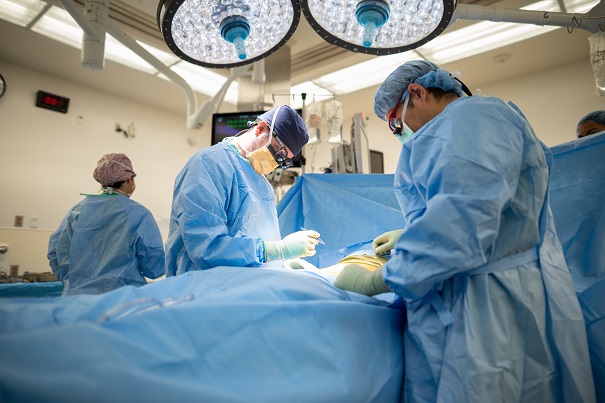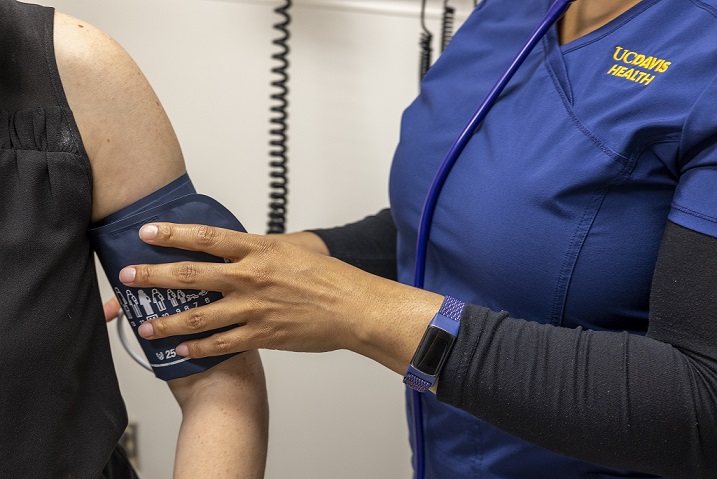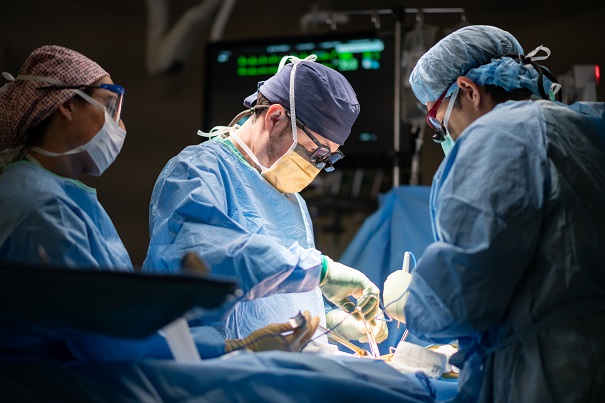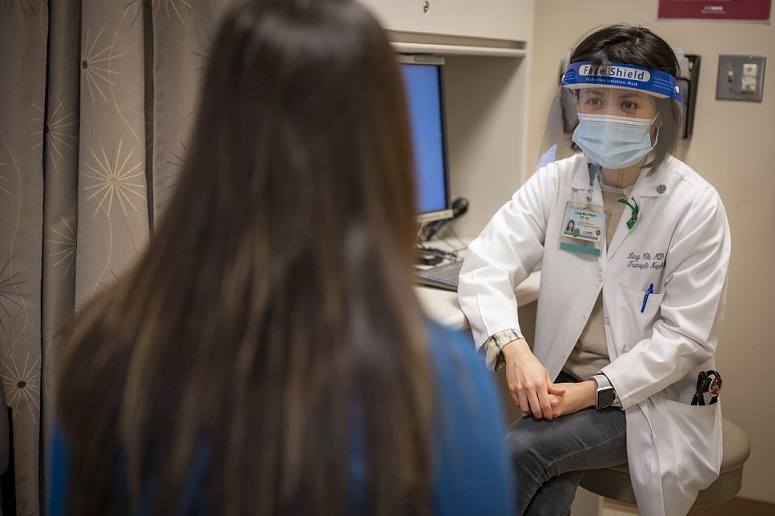Kidney Transplant
Our skilled team ensures you receive seamless, personalized care before, during and after kidney transplant surgery.
Medically reviewed by Yihung Huang, M.D. on Oct. 18, 2023.

Excellence in Kidney Transplant
The Kidney Transplant Program at UC Davis Health has focused on improving the lives of people with kidney failure for more than three decades. As one of the largest programs of its kind in the U.S., our team has extensive experience. We remain by your side with coordinated support, assistance and guidance throughout your transplant evaluation, surgery and follow-up care.
What Conditions Can Kidney Transplant Help Treat?
Kidney transplant is a surgical treatment for kidney failure. Chronic (long-term) kidney disease most often causes kidney failure.
The loss of kidney function in chronic kidney disease typically occurs over time. When people reach end-stage renal disease (when kidneys no longer work), they may become eligible for a kidney transplant.
Conditions that can lead to chronic kidney disease and kidney failure include:
- Diabetic nephropathy
- Glomerular kidney diseases
- Hereditary and congenital kidney diseases
- Hypertensive nephropathy
Accidents, injuries and poison can cause rapid (acute) kidney failure and require emergency care. Usually, this type of kidney failure is temporary, but it can sometimes be permanent.
Types of Kidney Transplant
Deciding whether to have kidney transplant surgery can be complex. A kidney transplant allows freedom from dialysis but carries some risks.
Our team helps you understand the transplant process and decide whether kidney transplant may be right for you. The two types of kidney transplant include:
Living Donation Kidney Transplant
You receive a kidney from a healthy living donor. The donor may be a relative, friend, acquaintance, or someone you’ve never met. A living donor allows you to receive a kidney transplant much faster with a better-quality organ. Your living donor does not have to be compatible with you. Paired exchange programs will help find you a compatible living donor.
If you know someone who wants to donate an organ to you, please ask them to register.
Deceased Donor Kidney Transplant
If you do not have a living donor, you will have to wait to receive a kidney from someone who has recently died.
Request an Appointment
As Sacramento's No. 1 hospital, you'll benefit from unique advantages in primary care and specialty care. This includes prevention, diagnosis and treatment options from experts in 150 specialties.
Referring Physicians
To refer a patient, submit an electronic referral form or call.
800-4-UCDAVIS
Patients
Call to make an appointment.
Consumer Resource Center
800-2-UCDAVIS
Kidney transplant starts with a detailed assessment of your kidney health and includes lifelong care after surgery. Our extensive experience helps us anticipate your needs and plan ahead, so you have the care and support you need.
-

Evaluation
Learn more about the evaluation processarrow_forwardKidney transplant evaluation includes meetings with key team members, a physical exam and a range of medical tests. Your specialist reviews the results with a transplant selection committee to determine whether you are eligible for a new kidney.
-

Finding a Donor
If you receive approval by our team, it’s important for you to try to find a living donor. Having a living donor helps you receive the transplant sooner with a good quality organ. If your living donor is not compatible with you, we are also a member of the National Kidney Registry which helps find a compatible match for you. Patients without living donors will generally need to wait many years on the United Network for Organ Sharing (UNOS) waiting list for a deceased donor kidney.
-

Kidney Transplant Surgery
Find out more about kidney surgeryarrow_forwardYour new transplant kidney is placed in the lower part of your abdomen. You can expect to stay in the hospital for about 4 to 7 days. As you prepare to go home, you learn about immunosuppressants and other medications you must take. You also learn how to identify signs of rejection.
-

Post-Transplant Care
Get more outpatient follow-up informationarrow_forwardOur transplant team follows you closely with frequent lab tests and visits. We are available 24 hours a day for questions or concerns. Eventually, your visits with the transplant team occur less often. It’s important to pay close attention to your health and see your local nephrologist and primary care provider routinely.
Risks of Kidney Transplant
Our close follow-up care after your surgery helps detect and treat issues early. In general, the risk of complications is low. Some of the potential problems that can occur include:
Surgical Complications
Risks of surgery include infection and allergic reaction to anesthesia medications.
Organ Rejection
Your immune system will see your transplanted kidney as foreign (not belonging to your body) and attack it. You must take immunosuppression medications for the rest of your life to help prevent rejection.
Delayed Function or Nonfunction
A kidney transplant from a living donor will function right away. However, some deceased donor kidney transplants can take days to weeks to function properly. You may need temporary dialysis if your transplanted kidney does not start working right away. Rarely, a deceased donor kidney may not work at all. In this case, you receive dialysis until a new kidney becomes available.
When to Contact Your Surgeon
Call your transplant team if you have any signs of infection or organ rejection. You will receive specific instruction at hospital discharge.

Ranked among the nation’s best hospitals
A U.S. News & World Report best hospital in cardiology, heart & vascular surgery, diabetes & endocrinology, ENT, geriatrics, neurology & neurosurgery, and pulmonology & lung surgery.

Ranked among the nation’s best children’s hospitals
U.S. News & World Report ranked UC Davis Children’s Hospital among the best in pediatric nephrology, orthopedics*, and pulmonology & lung surgery. (*Together with Shriners Children’s Northern California)

Ranked Sacramento’s #1 hospital
Ranked Sacramento’s #1 hospital by U.S. News, and high-performing in aortic valve surgery, back surgery (spinal fusion), COPD, colon cancer surgery, diabetes, gynecological cancer surgery, heart arrhythmia, heart failure, kidney failure, leukemia, lymphoma & myeloma, lung cancer surgery, pacemaker implantation, pneumonia, prostate cancer surgery, stroke, TAVR, cancer, orthopedics, gastroenterology & GI surgery, and urology.

The nation’s highest nursing honor
UC Davis Medical Center has received Magnet® recognition, the nation’s highest honor for nursing excellence.

World-class cancer care
One of ~59 U.S. cancer centers designated “comprehensive” by the National Cancer Institute.

A leader in health care equality
For the 13th consecutive year, UC Davis Medical Center has been recognized as an LGBTQ+ Healthcare Equality Leader by the educational arm of America’s largest civil rights organization.
